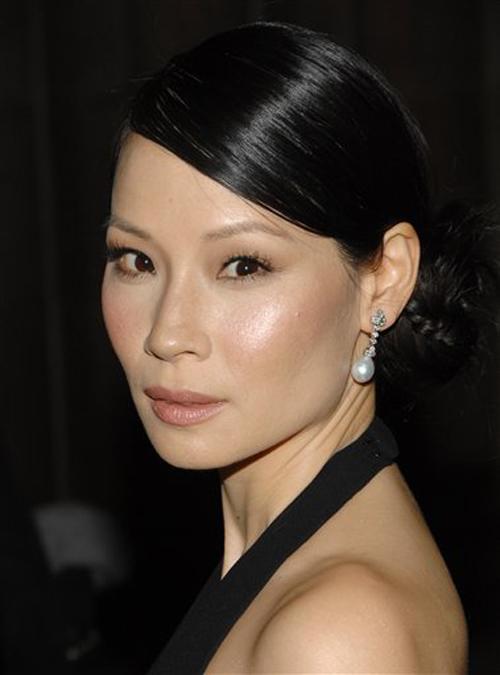The woman wears ‘Cashmere’: Lucy Liu returns to television
Jan 15, 2008
BEVERLY HILLS, Calif. – “It was never a goal to be out of television or in television,” says Lucy Liu of her return to TV in ABC’s “Cashmere Mafia.”
It’s her first as a series regular since 2002 when her wicked turn as the fiery Ling Woo on “Ally McBeal” ignited a film career – though it had never been the bigger screens or leading roles she was after.
“If someone says, ‘Do you want to do a cameo in ‘Chicago?’ I look at the script and think, ‘What can I bring to it?” she says referring to her five-minute appearance in the Academy Award-winning film. “Even if it’s a two-hour movie and I’m the lead, I’m not going to do it just for the face time. I want to be able to bring something that’s somewhat memorable.”
Certainly she has had her share of unforgettable moments, be it in the “Charlie’s Angels” movies or in Quentin Tarantino’s “Kill Bill: Vol. I” where the actress showed herself to be a tough chick with mean kicks.
“I love doing action movies, I love kung fu, but that doesn’t express who I am as an artist. What about the acting part of it?” the 39-year-old New York native muses. “There’s no green screen in this. It’s just bare-bones work.”
Get The Daily Illini in your inbox!
She gets down to business in “Cashmere Mafia” (Wednesdays, 10 p.m. EST), leading an ensemble that includes Frances O’Connor, Miranda Otto and Bonnie Somerville. Liu plays aggressive publishing executive Mia Mason who, despite being head-to-polished-toe together, has a troubled personal life.
“I didn’t want her to be this confident person who had everything together,” says Liu. “It’s more interesting when somebody is flawed. You can find so many other gifts that they have to discover within themselves and overcome.”
If you saw the pilot, you may have noticed something very “Sex and the City” about “Cashmere,” what with it being centered on the lives and loves of four successful women in Manhattan. That, and its pedigree: Darren Star of “Sex and the City” executive-producing and wardrobe designer Patricia Field outfitting the cast.
“This show stands alone from ‘Sex and the City,'” says Star. “This show is very much about the paradigm that has shifted in that balance of power between men and women in the workplace and how women are dealing with that.”
Which sounds similar to the upcoming NBC drama, “Lipstick Jungle,” produced by “Sex and the City” author Candace Bushnell about three New York businesswomen.
“This one is really about the lie of having it all,” offers Sharon Hall, senior vice president of development at Sony Pictures Television which produces “Cashmere.” “At the end of the day having it all, for these women, is that they have each other.”
Considering the notion of “having it all,” Liu shakes her head. “It’s all very confusing because I think what you want changes.”
These days she’s focused more on her humanitarian efforts with UNICEF and “contributing to society globally.”
And while she says she’s not as career-driven as she had once been, she has been doing more behind-the-scenes lately. First producing a documentary, and next she’ll executive-produce and star in “Charlie Chan” for 20th Century Fox. So it’s not surprising to learn that she’s collaborative on “Cashmere” as well.
“She challenges us to really keep it real, to keep it current and reflect real life,” says creator and executive producer Kevin Wade.
“Lucy’s brought a sense we don’t have – and I think this is really key,” Wade continues, “that she doesn’t ever want to play – nor should she be written – as hard-driving and tough-at-work and hard-driving and tough-with-men, or conversely as sort of a wallflower or subservient in her love life or social life.”
Still, not all of Liu’s suggestions are heeded. For instance, in the pilot, Mia’s fiance is warned never to utter the “R-word” to his ambitious bride-to-be – the “R-word” meaning “relax.”
“I was like, I don’t agree with that scene – that a woman would just flip out over somebody telling her to relax. But the men,” she says, emphasizing the “men” who produce the show, “felt very strongly that ‘relax’ was something that really sparked people to get all incited about, like ‘Don’t use that word!'”
Later she suggests that the battle of the sexes behind the scenes of “Cashmere” could be its own show, “and maybe we will if the strike continues,” says Liu, who supports the Hollywood writers.
If the work stoppage continues, however, it could prove detrimental to the future of “Cashmere,” which completed just seven episodes by the time of the walkout.
“What’s happening now with the strike is incredibly important, and sometimes it leads to better things even though there’s going to be a lot of sacrifices in the meantime,” Liu says.






